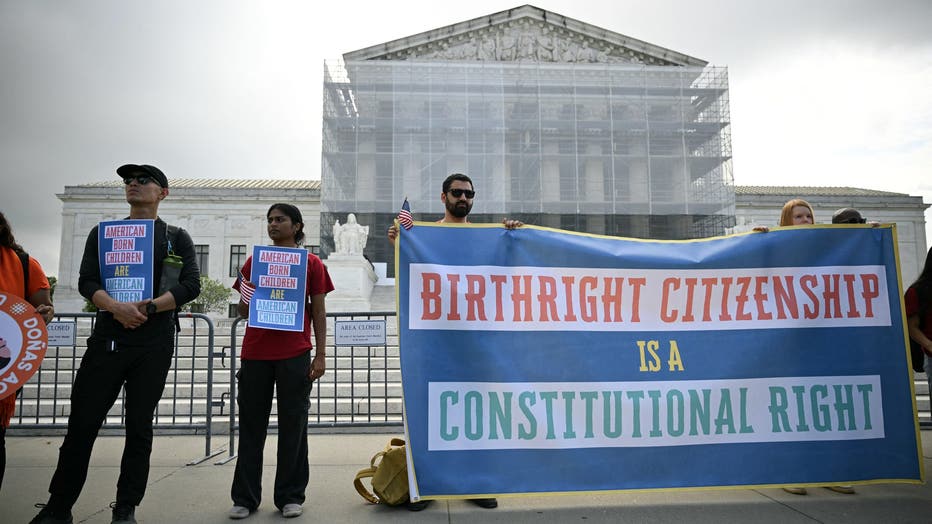Supreme Court hears arguments over birthright citizenship: What to know

Supreme Court to hear birthright citizenship case
The Supreme Court will hear oral arguments next month in the case challenging President Donald Trump’s attempt to end birthright citizenship, in what is likely to be one of the most highly anticipated cases to be reviewed by the high court since Trump took office. LiveNOW's Andrew Craft spoke about the case with former federal prosecutor Neama Rahmani.
The Supreme Court is hearing arguments this week over whether to allow the Trump administration to temporarily block birthright citizenship in at least 27 states until it makes a final ruling on the issue.
On Jan. 20, the day President Donald Trump was inaugurated for a second term, he signed an executive order hoping to end birthright citizenship. Since then, 22 states have joined a lawsuit to challenge the president’s order, and lower courts have so far blocked the executive order from taking effect anywhere in the United States.
In arguments Thursday, the Supreme Court will weigh the Trump administration's request to narrow those court orders so that they cover only the parties that sued in federal court.
The current fight is over what rules will apply while the lawsuits proceed through the courts. But even though the high court is not expected to issue a final decision about birthright citizenship, a ruling for the administration could lead to a confusing, if temporary, patchwork of rules that might differ based on what state children are born in or whether they are members of immigrants rights groups that sued.
RELATED: What is ‘habeas corpus’ and why might the Trump administration suspend it?
If the court agrees to limit the ability of judges to issue nationwide, or universal, injunctions, the restrictions would be allowed to take effect for now in at least 27 states.
What is birthright citizenship?
The backstory:
Birthright citizenship means anyone born in the United States automatically becomes an American citizen.
In the aftermath of the Civil War, Congress ratified the 14th Amendment in July 1868. That amendment assured citizenship for all, including Black people.

People hold a sign as they participate in a protest outside the US Supreme Court over President Donald Trump's move to end birthright citizenship as the court hears arguments over the order in Washington, DC, on May 15, 2025. (Photo by DREW ANGERER/A
"All persons born or naturalized in the United States and subject to the jurisdiction thereof, are citizens of the United States and of the State wherein they reside," the 14th Amendment says. "No State shall make or enforce any law which shall abridge the privileges or immunities of citizens of the United States."
But the 14th Amendment didn’t always translate to everyone being afforded birthright citizenship. For example, it wasn’t until 1924 that Congress finally granted citizenship to all Native Americans born in the U.S.
Why does Trump want to end birthright citizenship?
What they're saying:
Granting birthright citizenship is not the practice of every country, and Trump and his supporters have argued that the system is being abused and that there should be tougher standards for becoming an American citizen. Trump called American citizenship "a priceless and profound gift" in the executive order.
Some proponents of immigration restrictions have argued the words "subject to the jurisdiction thereof" in the 14th Amendment allows the U.S. to deny citizenship to babies born to those in the country illegally. Trump himself used that language in his 2023 announcement that he would aim to end birthright citizenship if reelected.
The other side:
Others have argued that ending birthright citizenship would profoundly damage the country.
"One of our big benefits is that people born here are citizens, are not an illegal underclass. There’s better assimilation and integration of immigrants and their children because of birthright citizenship," said Alex Nowrasteh, vice president for economic and social policy studies at the pro-immigration Cato Institute.
In 2019, the Migration Policy Institute estimated that 5.5 million children under age 18 lived with at least one parent in the country illegally in 2019, representing 7% of the U.S. child population. The vast majority of those children were U.S. citizens.
The nonpartisan think tank said during Trump’s campaign for president in 2015 that the number of people in the country illegally would "balloon" if birthright citizenship were repealed, creating "a self-perpetuating class that would be excluded from social membership for generations."
The Source: This report includes information from The Associated Press and previous LiveNow from FOX reporting. FOX's Megan Ziegler contributed.

